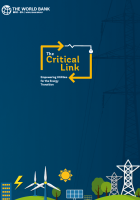Publications
EXECUTIVE SUMMARY
As the conduit between power demand and supply, the utilities that operate the world's transmission and distribution networks will be the critical link in the energy transition. Utilities will need to expand and modernize their networks to integrate variable renewable energy sources and meet growing demands for cleaner and more flexible power. According to the International Energy Association (IEA), the equivalent of the entire length of the world's grid networks will need to be added or refurbished by 2040 if countries are to achieve their energy and climate goals: As the off-takers of power generation, utilities need to be financially viable to enable the coming massive scale-up of investment in renewable energy projects and grid infrastructure.
Utilities will also need to lead the way in providing access to electricity to the nearly 700 million people who still lack it today, mainly in Sub-Saharan Africa. In addition, utilities will need to serve consumers with ever-more varied and complex power needs and an increasing range of distributed generation options, such as rooftop solar. In short, power utilities will be the critical enablers of the energy transition and achieving universal access. This paper aims to place the need for sustainable utilities in lower-income countries (LICs) and middle-income countries (MICs) at the heart of the energy sector dialogue. The focus of this paper is on the utilities that manage power transmission or distribution grids.
World Bank. 2024. The Critical Link: Empowering Utilities for the Energy Transition. © Washington, DC: World Bank. http://hdl.handle.net/10986/41618 License: CC BY-NC 3.0 IGO.




